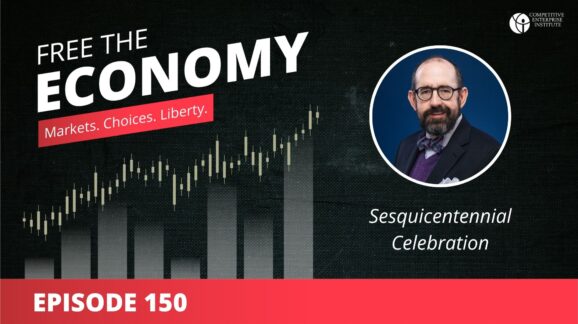There are two main areas in which Congress can enact meaningful reform. The first is to rein in regulatory guidance documents, which we refer to as “regulatory dark matter,” whereby agencies regulate through Federal Register notices, guidance documents, and other means outside standard rulemaking procedure. The second is to enact a series of reforms to increase agency transparency and accountability of all regulation and guidance. These include annual regulatory report cards for rulemaking agencies and regulatory cost estimates from the Office of Management and Budget for more than just a small subset of rules.
In 2019, President Trump signed two executive orders aimed at stopping the practice of agencies using guidance documents to effectively implement policy without going through the legally required notice and comment process.
Featured Posts

Blog
Free the Economy podcast: Sesquicentennial celebration
In this week’s episode we celebrate the show’s sesquicentennial anniversary – that is, our 150th episode. We look back at the dozens of smart,…

Blog
Shutdown lesson: Depend less on DC
The record-length shutdown showed how dependent many Americans are on Washington. This is one of the biggest flaws in the ongoing nationalization of politics. In…

Blog
The week in regulations, the final shutdown edition: Manifest mailing and broken trash incinerators
The federal shutdown is over. Since the Federal Register has a few days’ lag time for publishing agency documents, it will likely take until this…
Search Posts
Op-Eds
Misnamed Activists Are Thorns In Rose Of Agbiotech Foods
In a spin-dominated world where activists claim—often on the flimsiest of data—that this, that or the other thing causes cancer or threatens the…
Op-Eds
Risks in the Modern World: What Prospects for Rationality?
Risk refers to the likelihood that something will go wrong.[1] People naturally fear such mishaps, and risk aversion is a basic survival trait. Only non-survivors…
Op-Eds
Global Tax; or Global Tax Reform?
Am I the only one who noticed that the Kyoto Protocol (imposing artificial constraints on energy use to regulate atmospheric carbon dioxide to…
News Release
UN Sea Treaty Brings ‘Tragedy of the Commons’
Contact for Interviews: <?xml:namespace prefix = o ns = “urn:schemas-microsoft-com:office:office” /> Richard Morrison, 202.331.2273 …
Study
The Price is Right—Or Better Be!
Full Document Available in PDF On the popular television game show “The…
Op-Eds
New Agenda Fails to Address Problems
George Bernard Shaw once observed that: “The reasonable man adapts himself to the world; the unreasonable one persists in trying to adapt the…
Staff & Scholars

Clyde Wayne Crews
Fred L. Smith Fellow in Regulatory Studies
- Business and Government
- Consumer Freedom
- Deregulation

Ryan Young
Senior Economist
- Antitrust
- Business and Government
- Regulatory Reform

Fred L. Smith, Jr.
Founder; Chairman Emeritus
- Automobiles and Roads
- Aviation
- Business and Government

Sam Kazman
Counsel Emeritus
- Antitrust
- Automobiles and Roads
- Banking and Finance

Marlo Lewis, Jr.
Senior Fellow
- Climate
- Energy
- Energy and Environment